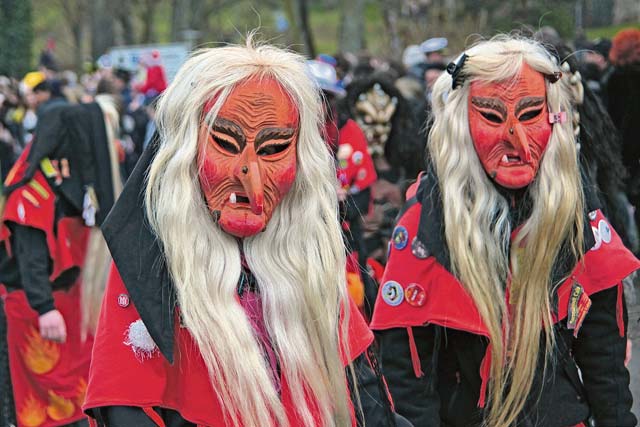
Parades and other activities during Fasching can liven up dreary months of winter, and are a festive tradition throughout Germany.
There are five seasons in Germany: spring, summer, fall, winter and Fasching (carnival) which takes place in January and February.
The Fasching season officially begins Jan. 7, one day after Epiphany, or Three King’s Day. In some areas, however, Fasching guilds commemorate the beginning of Fasching on Nov. 11 at 11:11 a.m. with local and ceremonial events that prepare for the official start of the foolish season in January. During the middle ages, the number 11 represented the “Narrenzahl,” or fool’s number.
Fasching or “Fastnacht” originates in the word “fasting” and marks the week leading up to Ash Wednesday, where the 40-day Lent before Easter begins. For many Germans, Fasching represents a time when citizens “let off steam,” and live it up before Lent. Typically, Fasching is celebrated with fests, parades, music and many “foolish” events.
The main events and parades happen during the traditional Fasching week, starting on “Schmotziger Donnerstag” (Greasy Thursday) or “Weiberfasching,” women’s carnival in February.
The Swabian word “schmotzig” means lard or grease and refers to the opulent food eaten during Fasching, such as “Fasnetsküchle” (Fasching doughnuts). The remainder of the Fasching week is Fasching Saturday and Sunday, Rose Monday and Fat Tuesday.
In the evening of Fat Tuesday, the “Fastnacht,” represented by a witch in southern Germany, is buried in a casket and the wild days end at midnight. In Stuttgart, Bad Cannstatt’s “Kü-belesmarkt” Fasching association kicks off the area’s first Fasching events on Greasy Thursday, or women’s carnival, by setting up the “Narrenbaum,” or fool’s pole, at the Marktplatz, followed by a parade throughout the downtown area.
Neuhausen, just 15 kilometers outside Stuttgart, is one of the most popular Fasching metropolises in the area. The town celebrates Greasy Thursday with the “Hexentanz,” or witch’s dance at Schlossplatz Square.
During the various Fasching parades in southern Germany, “Narren,” or Fasching fools with wooden masks in the image of witches, devils and grotesque animals can be seen in many towns. Be on the lookout for Narren walking up to you to either ruffle your hair or drop you a piece of candy.
Follow the Culture and Leisure section of www.stuttgartcitizen.com for upcoming Fasching activities.
